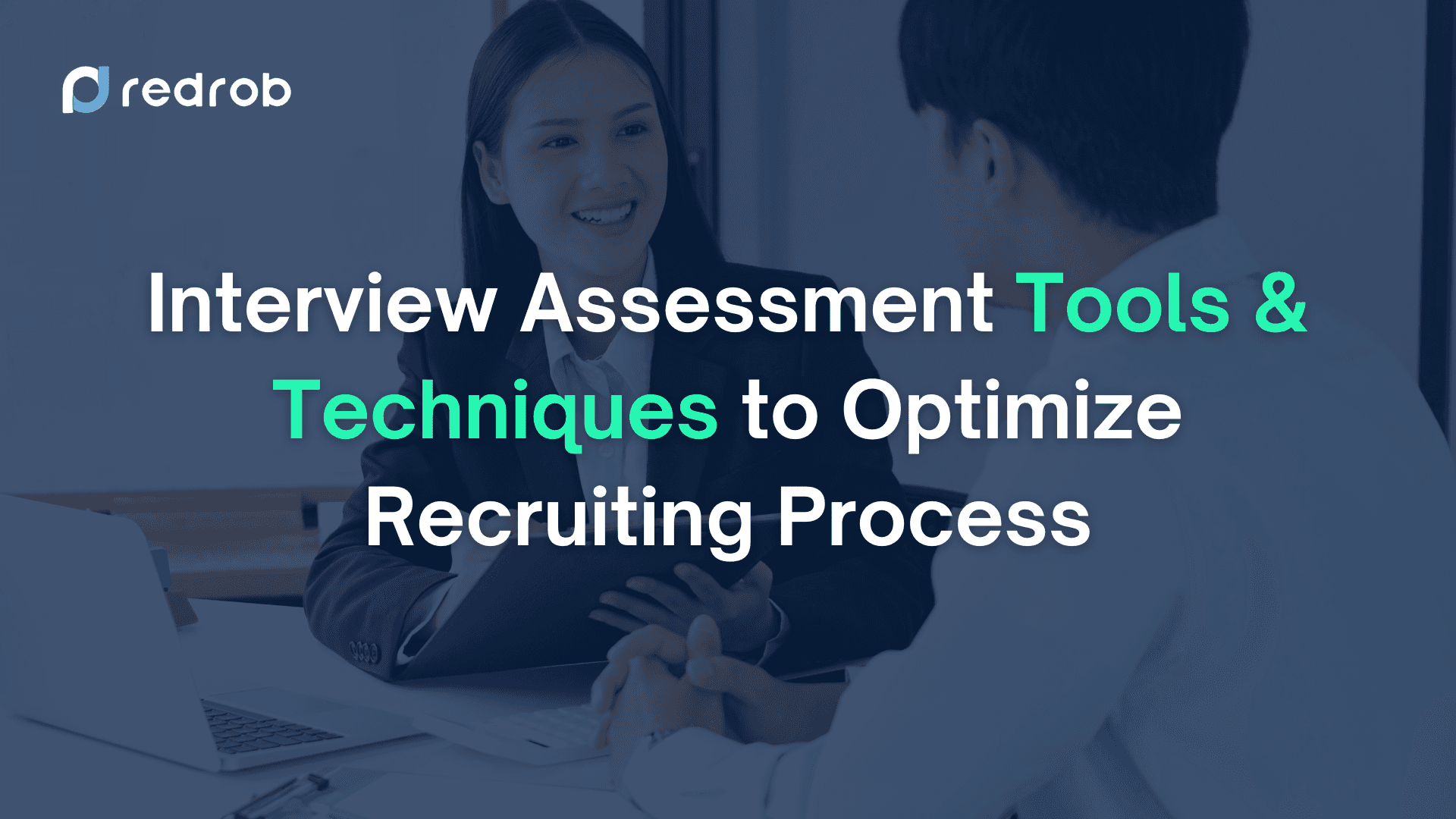Recruitment
Top Interview Assessment Tools and Techniques to Optimize Recruiting Process

Soumyata Singh
Dec 16, 2024
10 mins read
Hiring can feel overwhelming—sorting through endless resumes, scheduling interviews, and finding the right fit for your team. What if there was a way to simplify this? With the proper interview techniques and assessment tools, you can streamline hiring, making finding top talent easier and more efficient.
Curious about how to pick the best tools for your team? Which features really matter? This guide will dive into top assessment tools, practical tips, and insights that help you hire smarter. Let’s get started.
Understanding Interview Assessment Tools
Interview assessment tools help you evaluate candidates’ skills and suitability for a role. These tools provide structured methods to measure key competencies, reducing subjective judgment. Toda, the best interview techniques and assessment tools ensure consistency, making hiring decisions more accurate and fair. With these tools, you can assess technical skills, cultural fit, and problem-solving abilities.
Benefits of These Tools for Recruiting
Integrating interview techniques and assessment tools can transform your recruiting efforts. They bring tangible benefits, such as:
Efficiency: Streamline your hiring by automating parts of the interview process.
Unbiased Selection: Reduce unconscious biases by standardizing evaluation metrics.
Cost Savings: Avoid costly mis-hires through better candidate evaluation.
Improved Candidate Experience: Using structured tools shows candidates a clear and organized process, making them more likely to engage positively.
Assessment tools reduce bias, leading to a more diverse workforce. These tools help save both time and resources, as they allow early identification of top talent.
To optimize your recruiting process further, let’s explore the different assessment tools available.
Popular Types of Interview Assessment Tools
The right interview techniques and assessment tools make hiring more effective and insightful. Different tools offer unique ways to identify top talent, from assessing skills to understanding a candidate’s personality. Here are the most popular types.
1. Work Samples and Simulations
Work samples and simulations let candidates demonstrate their skills through real or simulated tasks. These tests are highly effective for technical roles where practical knowledge is key. For example, software developers might complete a coding challenge while sales candidates handle a mock customer call. These assessments:
Provide direct insights into job-relevant skills.
Show how candidates approach tasks they’ll perform on the job.
Companies find work samples valuable for understanding real capabilities.
2. Aptitude and Cognitive Ability Tests
Aptitude tests measure general mental abilities like reasoning, logic, and problem-solving. Cognitive ability tests predict job success across roles and industries, especially in technical and analytical positions. Common aptitude tests assess:
Logical reasoning
Numerical ability
Verbal comprehension
These tests clearly show a candidate’s ability to adapt, learn, and make decisions under pressure.
3. Structured and Asynchronous Video Interviews
Video interviews, whether live or recorded (asynchronous), let you assess candidates remotely. Structured interviews use consistent questions, allowing for objective evaluation across candidates. Asynchronous interviews, where candidates record answers on time, are particularly efficient when handling large candidate pools. With structured video interviews, you can:
Ensure fairness by comparing consistent responses.
Quickly review recordings, saving time in the early hiring stages.
Platforms like iMocha and Talview offer video interview options with added features like transcription and AI analysis.
4. Personality and Psychometric Tests
Personality tests assess traits such as emotional stability, openness, and conscientiousness. Psychometric assessments provide insights into how candidates might fit within a team or handle job pressures. Tools like the Big Five Personality Test are commonly used to gauge these aspects.
These assessments help you understand if a candidate’s personality aligns with your company culture. When used correctly, they can reduce turnover by up to 25%.
Understanding each type of tool helps you choose the best match for different roles. Let’s examine the features that make assessment tools truly effective in the next section.
Key Features of Effective Assessment Tools
Effective interview techniques and assessment tools share essential features that make them reliable and adaptable. These features enhance the evaluation process and ensure fair and accurate candidate assessments. Let’s explore some of these key features.
Robust Question Libraries
A comprehensive question library allows you to tailor assessments to each role. A strong library covers various skill levels and job categories, allowing you to pick questions relevant to a candidate’s experience and the role’s requirements. With a diverse question bank, you can test skills ranging from technical abilities to soft skills.
For example, tools like Redrob offer thousands of questions across many industries, making matching assessments with specific job roles easy. This feature ensures your assessments remain relevant and efficient.
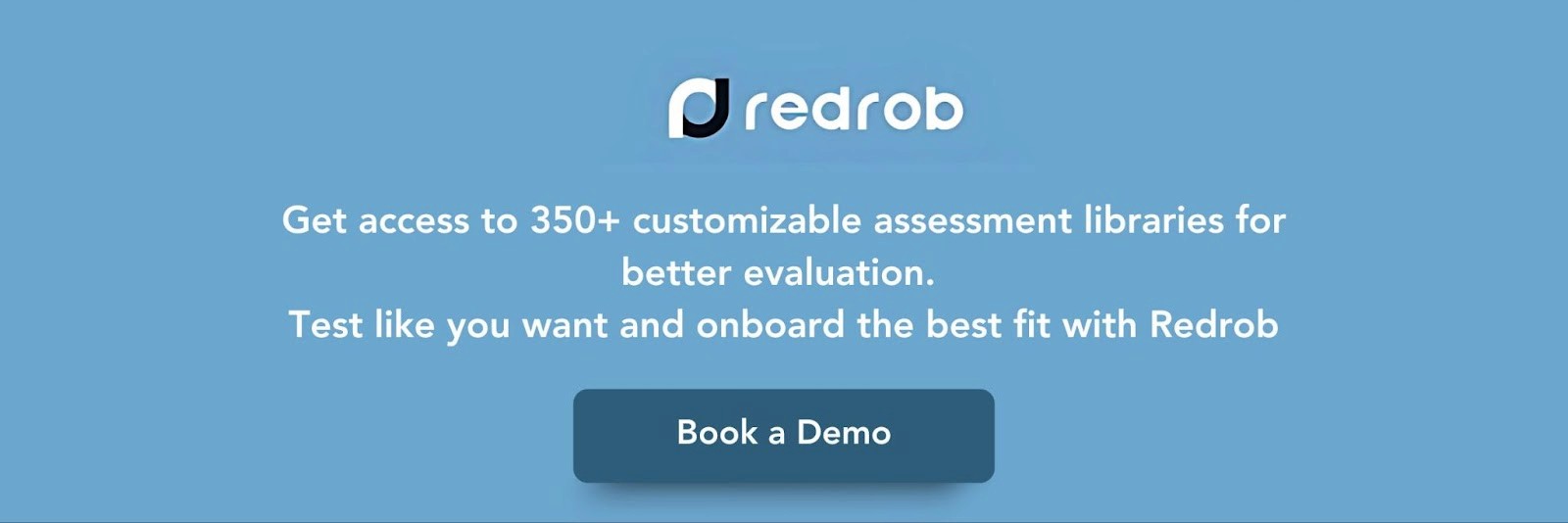
Real-Time Analysis and Reporting
Real-time analysis helps you make fast, data-backed decisions. With real-time reports, you can monitor candidate performance instantly, identify top performers, and streamline your interview process. Many recruiters found that real-time reporting sped up their decision-making.
Some tools also provide easy-to-understand dashboards, enabling recruiters to quickly track candidate performance and compare results. This feature gives you the insight to make timely, informed hiring choices.
Anti-cheating Mechanisms
Maintaining test integrity is crucial in online assessments. Anti-cheating mechanisms such as browser lockdowns, random question sequencing, and candidate verification through video or photos help keep the process fair. Tools with these features ensure that candidates cannot easily bypass the system, giving you more accurate results.
For instance, iView.ai and NinjaInterview use AI-driven proctoring and screen monitoring, adding security and confidence to online assessments.
Customizable Assessment Formats
Customizable formats let you create assessments that reflect your organization’s hiring needs. This feature allows you to modify test lengths, difficulty levels, and question types. Customizable tools will enable you to design assessments that suit roles ranging from entry-level to executive positions.
By tailoring assessments, you gain deeper insights into each candidate’s strengths. Plus, customization options ensure you can align assessments with job responsibilities effectively.
With these features in mind, let’s explore the top interview assessment tools on the market today so that you can find the best fit for your recruiting needs.
Top Interview Assessment Tools in the Market
Selecting the right interview techniques and assessment tools can streamline hiring and boost candidate quality. Here are some top tools to help you find the best fit for each role while saving time and improving accuracy.
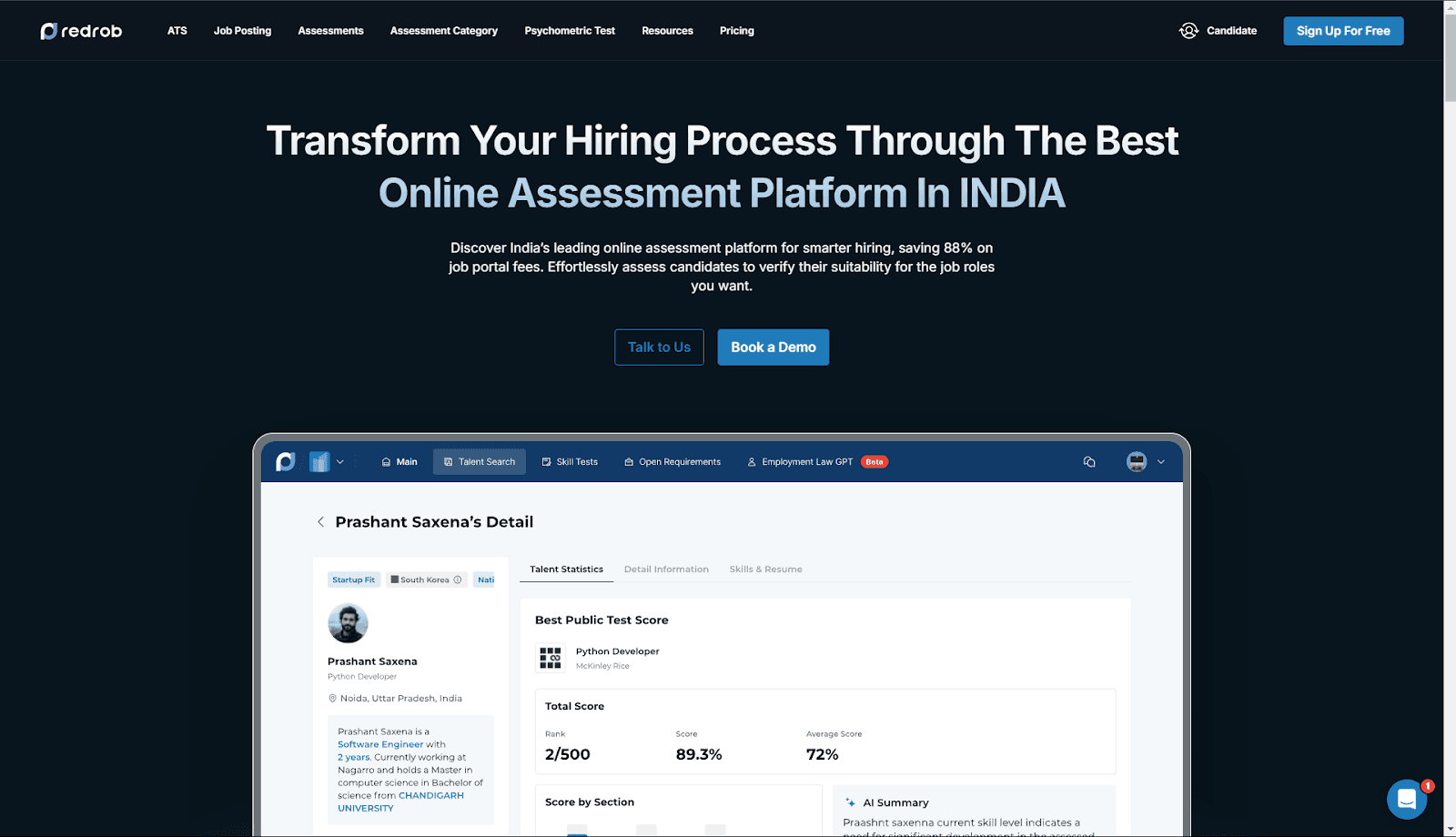
1. Redrob: AI-Powered Hiring and Language Proficiency Assessment
Redrob brings AI-driven recruiting to the forefront with tools that simplify and streamline the hiring process. Known for its language proficiency assessment tools, Redrob accurately evaluates candidates' communication skills, making it an excellent fit for roles requiring specific language competencies. Redrob's platform also supports a range of assessments, from technical skills to personality evaluations, giving you a holistic view of each candidate.
It includes automated video interview capabilities, allowing you to assess candidates asynchronously and without time constraints. Its AI-driven insights help recruiters eliminate bias by evaluating each candidate’s communication style, fluency, and overall language skills in a standardized way. Many recruiters find language proficiency assessment tools beneficial for roles needing multilingual skills, which drives Redrob’s popularity across global hiring markets.
If you’re looking for a tool that combines AI, language assessment, and candidate scoring, Redrob is a comprehensive option to consider. Explore more about it.
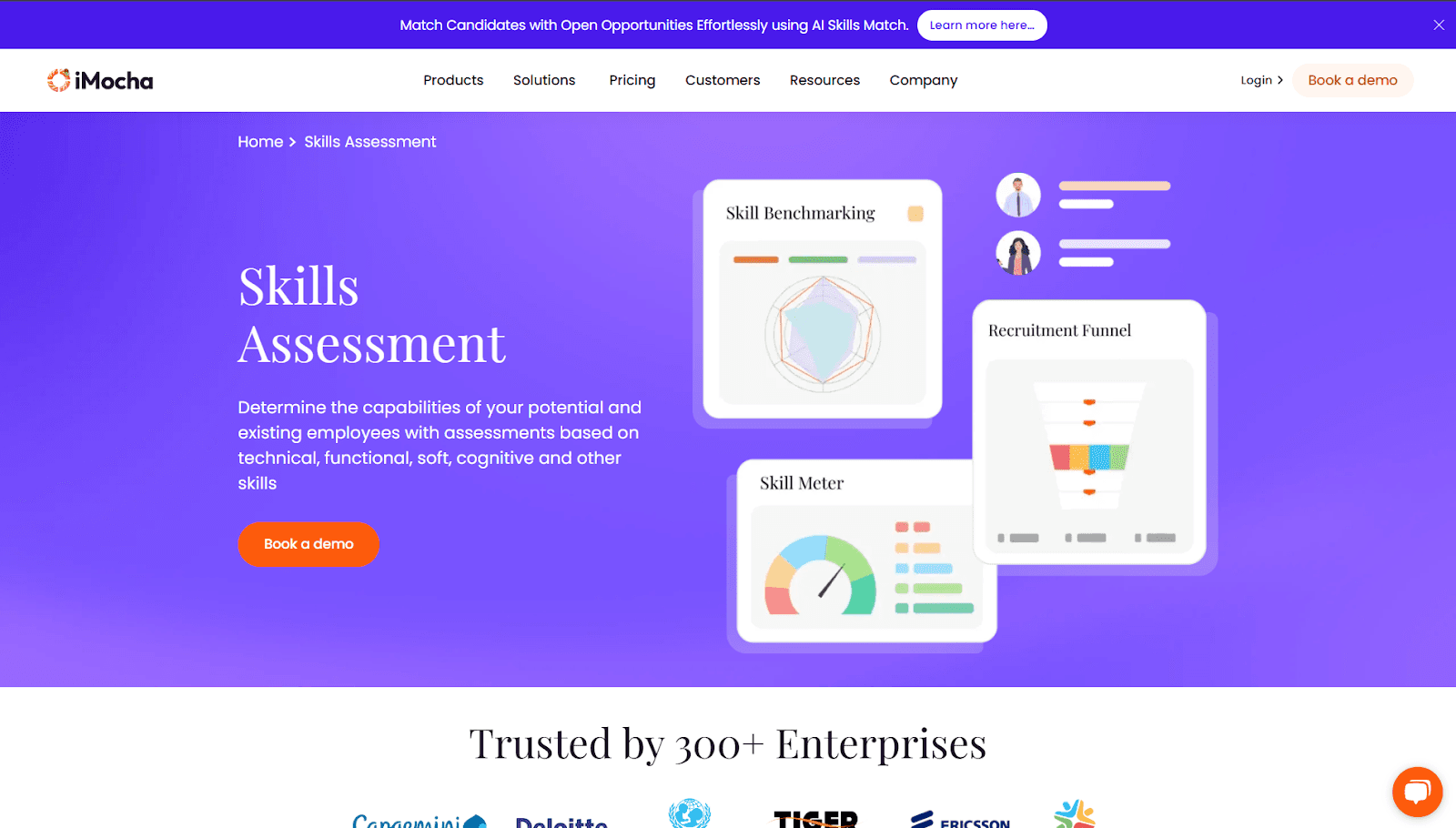
2. iMocha: Skill Intelligence and Video Interviews
iMocha offers an expansive skill intelligence platform designed to effectively match candidates’ skills with job requirements. With over 2,000 pre-built and custom skill assessments, iMocha allows you to test technical, cognitive, and soft skills comprehensively. The tool also integrates video interviews, enabling you to assess communication skills and technical proficiency. iMocha’s anti-cheating mechanisms, including webcam monitoring and random question sequencing, make it ideal for remote hiring.
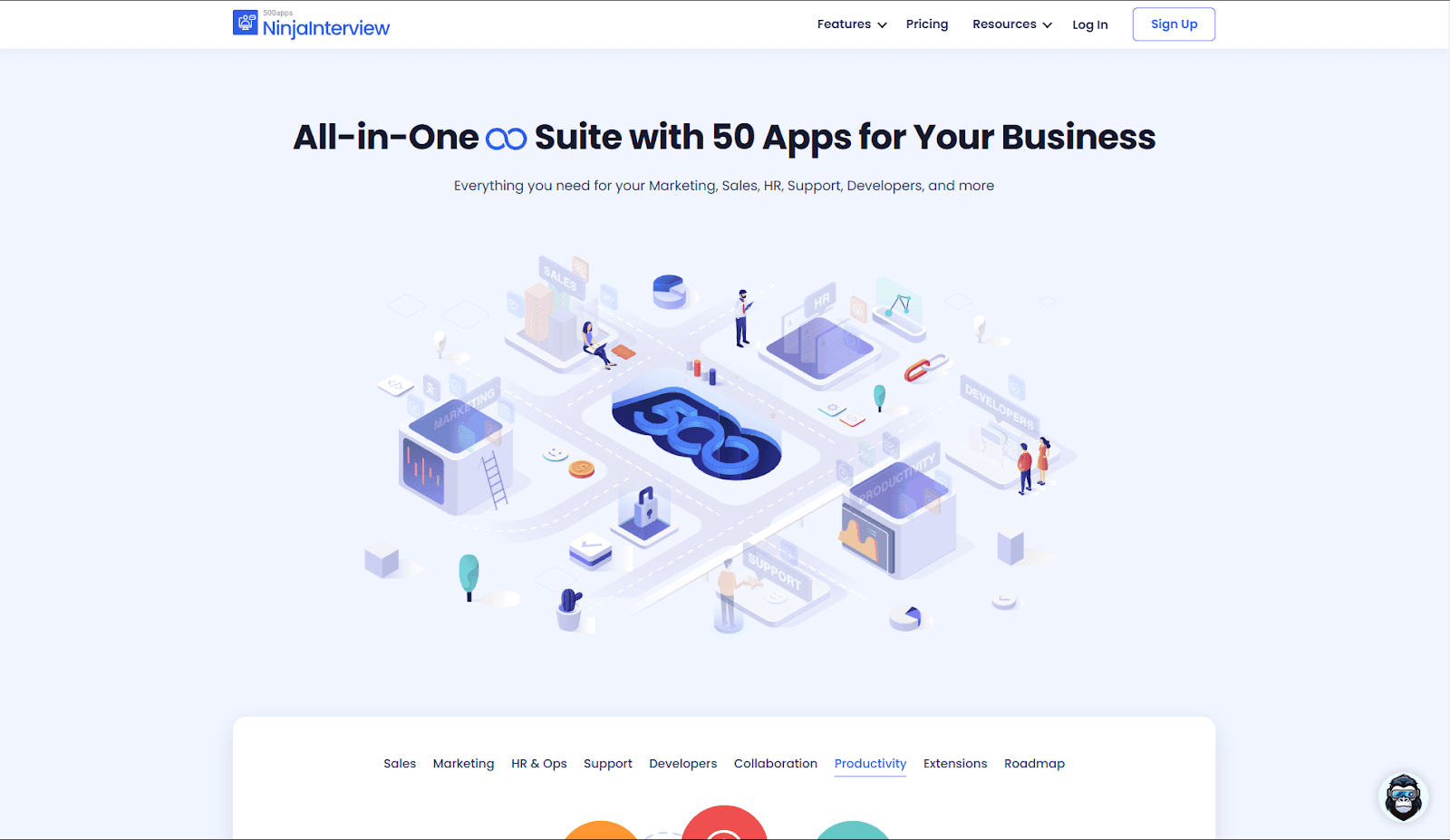
3. NinjaInterview: Virtual Process Optimization
NinjaInterview streamlines the hiring process by offering virtual assessments that evaluate candidates across multiple skills and roles. It provides customizable assessments, automated video interviews, and intuitive data analytics to help you make quick, informed decisions. NinjaInterview’s strengths lie in its flexible virtual platform and anti-cheating features, ensuring candidates remain focused. The tool allows you to assess up to 1,000 candidates simultaneously, making it ideal for large-scale hiring.
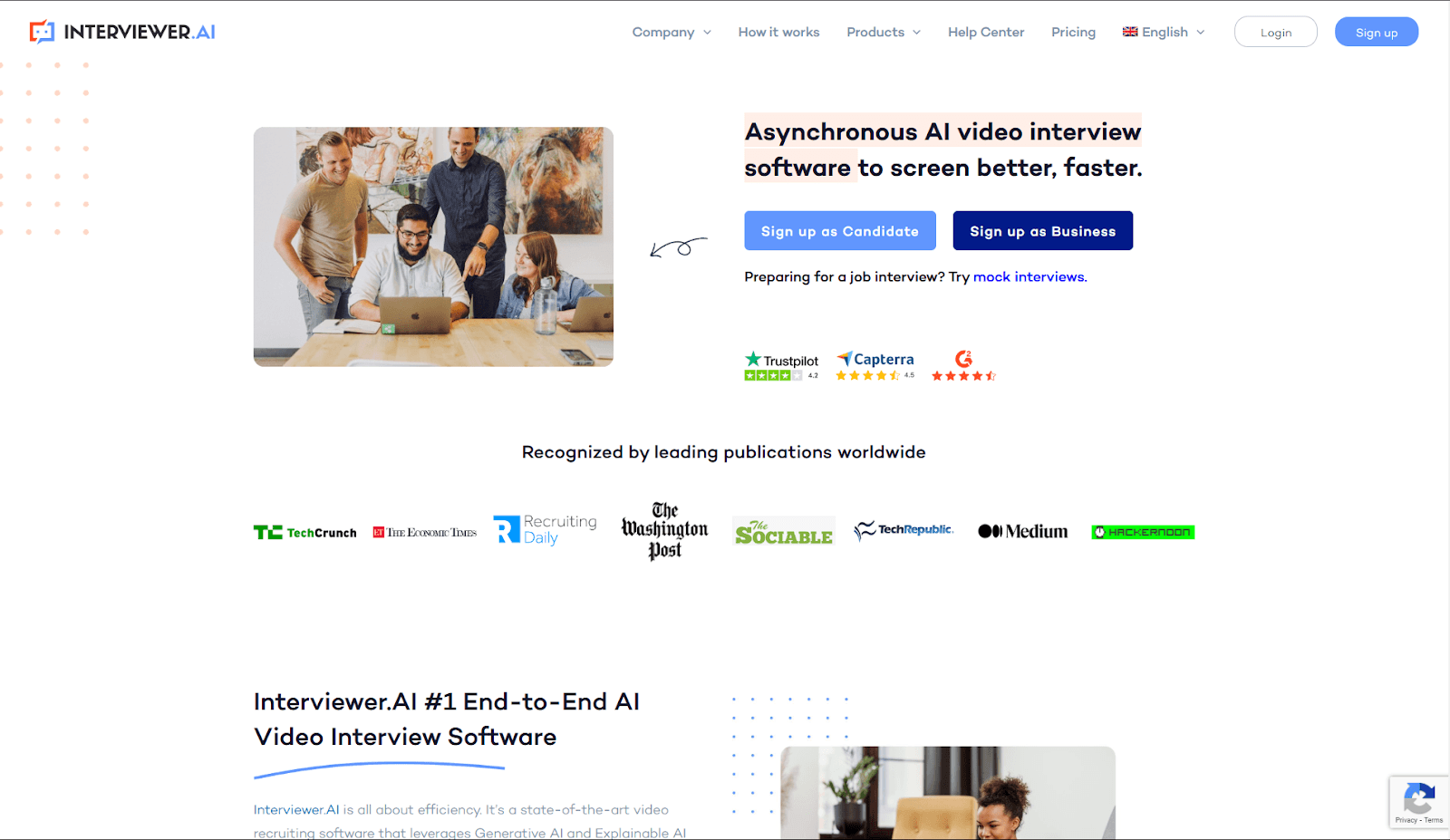
4. Interviewer.ai: AI-Powered Bias-Free Interviews
Interviewer.ai combines AI and behavioral analysis to deliver fair and objective candidate evaluations. This tool analyzes voice, facial expressions, and speech patterns to identify ideal candidates based on non-verbal cues and performance data. Interviewer.ai aims to support a more diverse and inclusive hiring process by using AI to eliminate bias. Interviewer.ai’s bias-free approach makes it a popular choice for companies prioritizing diversity.
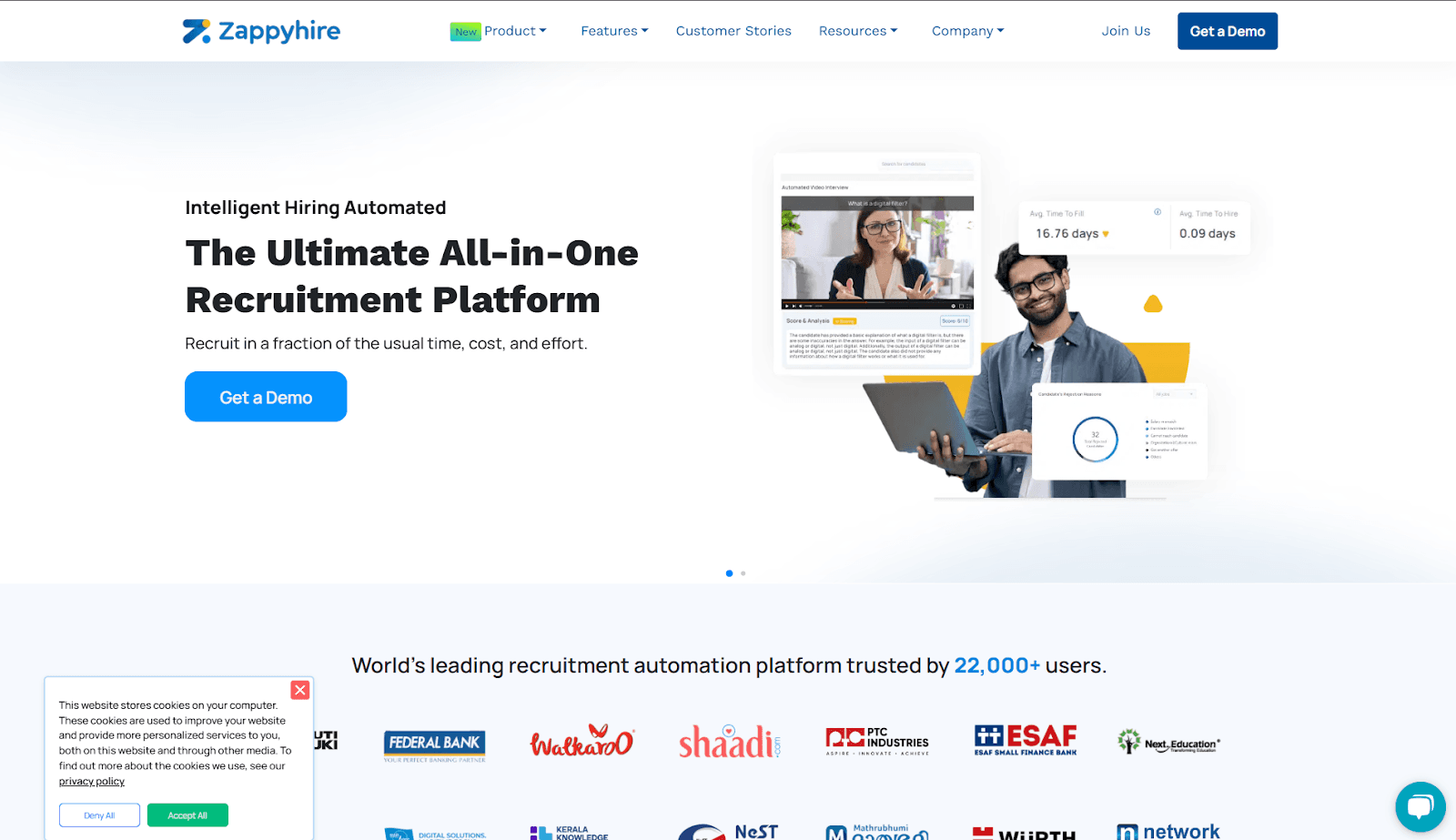
5. ZappyHire: Automated Talent Management
ZappyHire offers an end-to-end hiring platform to automate interview scheduling, applicant tracking, and skill assessments. With ZappyHire, you can assess technical and non-technical skills using customized tests. The tool’s automated talent management system also allows you to track candidate progress and send personalized messages throughout the recruitment process. ZappyHire’s automation features reduce the need for manual work, making it an efficient choice for time-sensitive hiring.
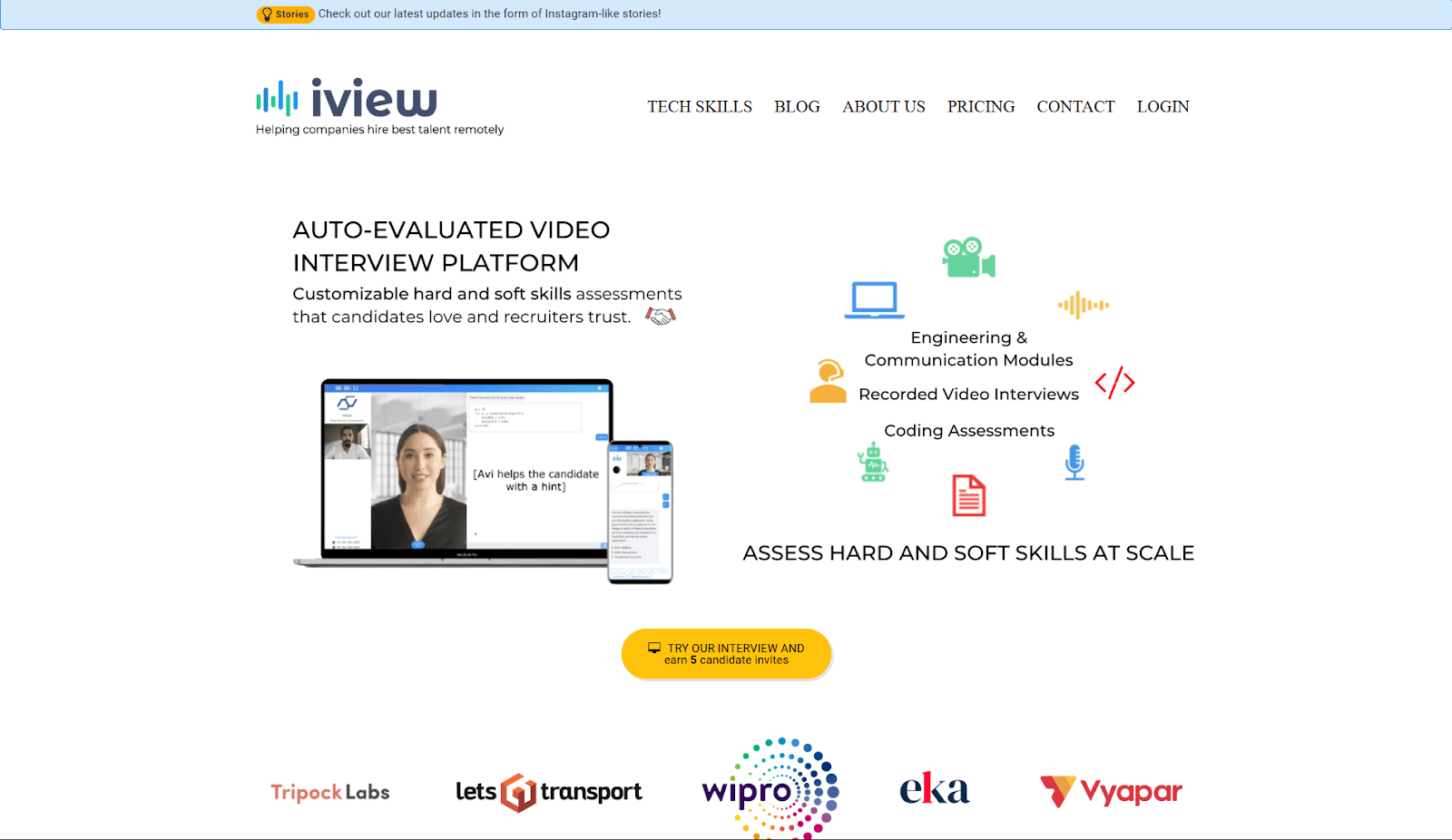
6. iView.ai: Conversational Assessment Platform
iView.ai provides a conversational assessment platform that evaluates candidates through live and pre-recorded video interviews. It uses AI to assess communication skills, confidence, and personality traits, helping recruiters gauge cultural fit quickly. The tool’s AI-powered conversational platform also enables you to score candidates on non-technical attributes crucial for roles requiring strong interpersonal skills.
With iView.ai, you can create customized assessment templates for specific roles. Recruiters appreciate iView.ai for its simplicity, as it reduces the need for additional tools to evaluate soft skills.
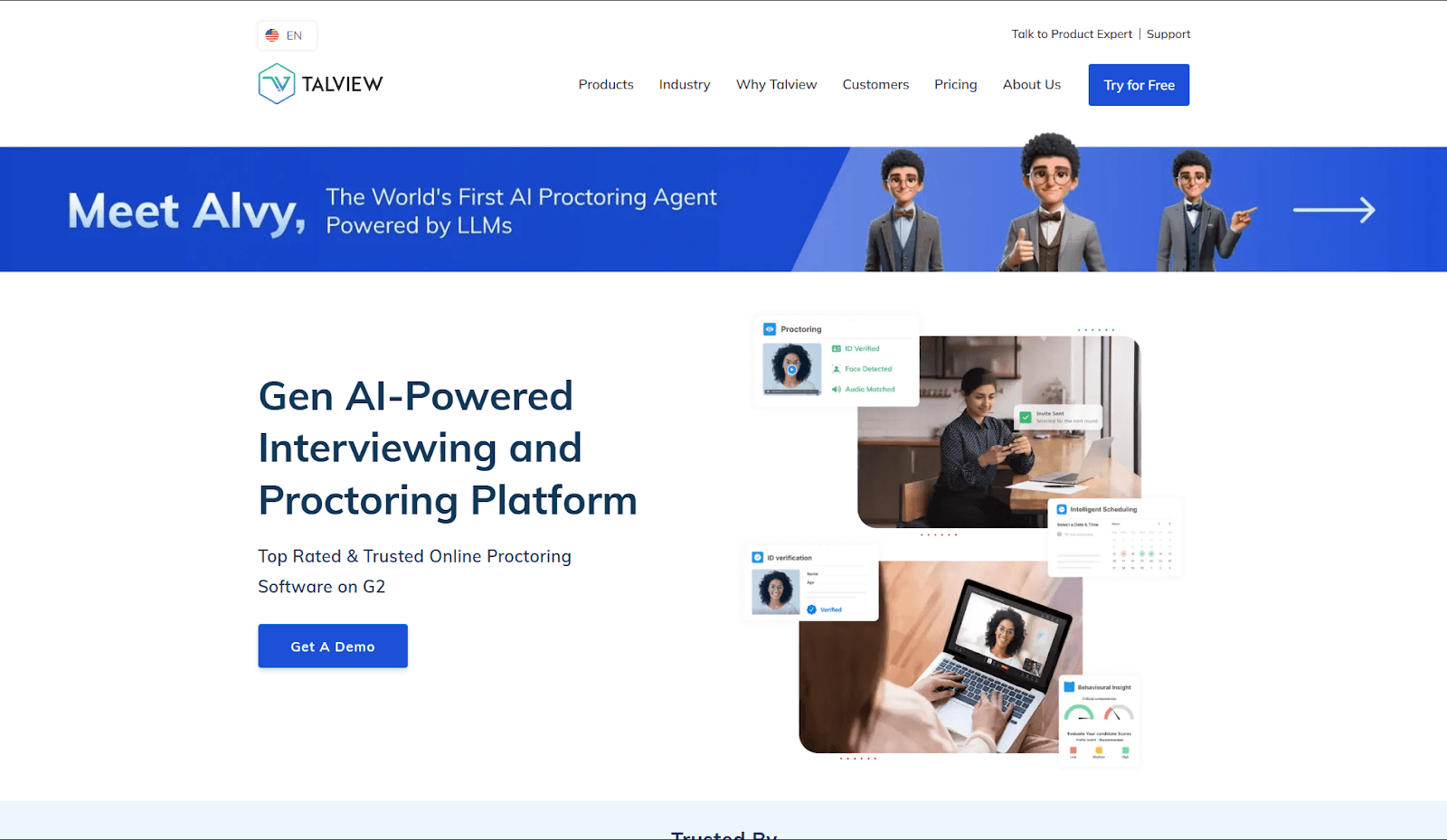
7. Talview: End-to-End Automated Hiring Solutions
Talview is a comprehensive hiring platform offering automated assessments, video interviews, and proctoring solutions. It provides robust tools to help you evaluate cognitive skills, emotional intelligence, and technical expertise. Talview’s anti-cheating features, like secure browsing and behavior tracking, add trust to remote assessments. Talview’s end-to-end approach is ideal for organizations needing a complete hiring solution, from evaluation to onboarding.
Understanding these top tools allows you to choose an assessment solution that best meets your hiring needs. Next, let’s examine the pros and cons of using assessment tools in the recruiting process.
Pros and Cons of Using Assessment Tools
Interview techniques and assessment tools bring clear benefits to the hiring process, but there are also challenges to consider. Knowing both sides can help you make informed choices when selecting tools.
Pros
Unbiased Evaluation: Assessment tools offer objective scoring, minimizing human bias. With features like AI-based analysis, these tools focus purely on skill and performance, helping you to make fairer hiring decisions.
Cost Efficiency: Automated assessments reduce costs associated with traditional, lengthy interviews. You can save time and resources by screening more candidates in less time, ultimately streamlining your budget.
Cons
Potential Reliability: Some tools may not consistently measure all competencies, especially for unique roles. Variability in test quality could mean that a candidate’s score might not entirely reflect their skills, which can impact hiring accuracy.
Validity Issues: Not all assessment tools align perfectly with every role or industry. A mismatch between the test’s focus and job requirements can lead to inaccurate results. This lack of alignment may leave you questioning whether the tool measures what it claims.
Incorporating interview techniques and assessment tools into your hiring process requires weighing these factors carefully. Next, let's explore how to maximize their effectiveness in your recruitment strategy.
How to Use Assessment Tools Effectively?
To get the most out of interview techniques and assessment tools, align them closely with your hiring goals. Proper test design, integration, and training ensure they work effectively within your recruitment process.
Effective Test Design Aligned with Roles
Create assessments that reflect each role’s specific requirements. Tailoring test content to the skills and competencies needed in the job helps you gain meaningful insights. For example, a software developer role might prioritize coding challenges, while a sales position could focus on situational judgment tests. Well-designed assessments will likely yield candidates who fit the role and your team culture.
Integrate with Existing HR Systems
Integrating assessment tools with your HR software streamlines your process and improves data flow. Using a unified system for applications, assessments, and tracking helps your team access candidate data in one place, boosting efficiency. This seamless integration also saves time by reducing data entry and enabling easy access to assessment results throughout hiring.
Train HR Teams for Better Implementation
Train your HR teams on how to use and interpret the assessment tools. When team members understand the purpose and scoring of each assessment, they’re better equipped to evaluate results effectively. Regular training sessions can keep everyone up to date with best practices and ensure consistent application of the tools across roles.
Applying interview techniques and assessment tools strategically improves the hiring process. Next, let’s explore key trends shaping the future of these tools in recruitment.
Tips to Choose the Right Tools for Your Organization
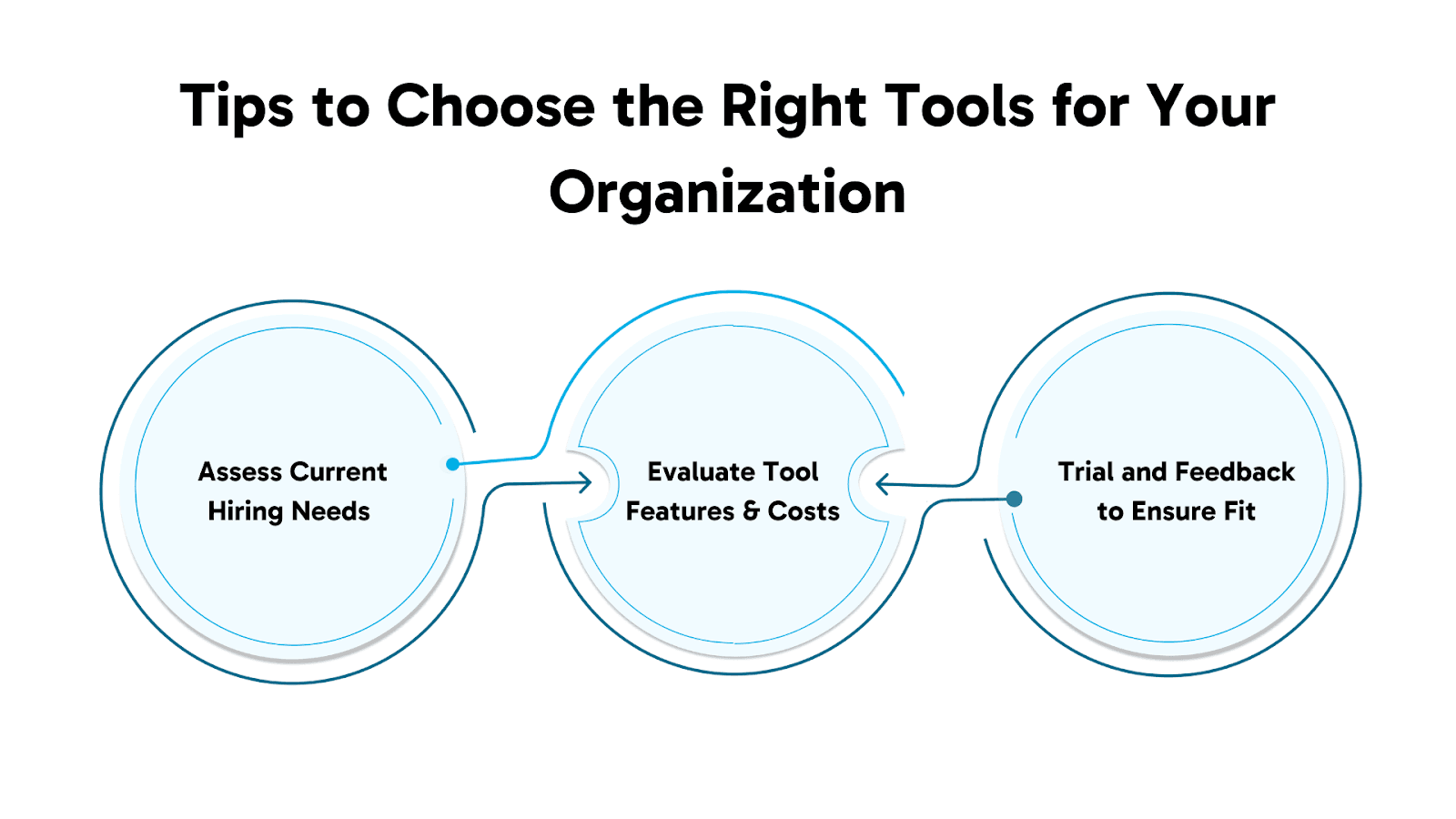
Selecting effective interview techniques and assessment tools is essential for finding top talent. By aligning tools with your specific hiring needs, you ensure a streamlined and successful recruitment process.
1. Assess Current Hiring Needs
Start by analyzing your current hiring requirements. Consider the roles you’re hiring for and the skills that matter most. Tools with coding challenges might be best if your team is looking for tech talent. Personality and situational assessments can give you insights into interpersonal skills for customer-facing roles.
2. Evaluate Tool Features and Costs
Examine each tool’s features about your needs. Look for key functionalities, such as customizable assessments, detailed analytics, and easy integration with your HR systems. Compare costs to find a tool that balances functionality and affordability well. A tool with robust features may cost more, but it can be a worthwhile investment for accurate candidate insights.
3. Trial and Feedback to Ensure Fit
Test the tools before fully adopting them. Many providers offer free trials so you can assess usability and see if the tool meets your standards. Gather feedback from HR team members to identify any issues or gaps in functionality. A trial phase helps confirm the tool’s fit with your interview techniques and assessment tools for a seamless hiring experience.
Choosing the right tools can improve recruitment efficiency and accuracy.
Align Your Assessments With Redrob
Choosing the proper interview techniques and assessment tools is key to hiring effectively. By strategically using these tools, you enhance hiring efficiency and make the process smoother for your team. However, finding the right balance between automation and human judgment is essential. Tools can help you evaluate skills and fit, but human insight is necessary for understanding a candidate's potential.
Effective hiring combines the precision of assessment tools with thoughtful decision-making. Using these tools wisely simplifies recruitment and ensures you bring the right talent into your organization.
Redrob lets you customize assessment tests, hiring strategies, and standard pipelines so you can efficiently track candidates and select the best fit according to your preferences. This ensures you keep up with your organization’s objectives and best practices while hiring faster and better. Access our pre-prepared libraries of assessment tests and psychometric analysis. Start Your FREE Trial Now!
